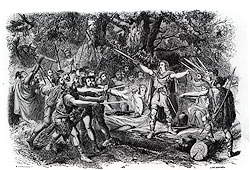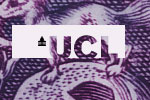The Batavian myth in the 19th century
During the Batavian Republic, and before and after, the Batavians remained a topic of interest. The well-known Dutch historian Jan Wagenaar (1709-73)
described the Batavians for generations of Dutch schoolchildren in his book Vaderlandsche Historie Verkort (1782). The instructive book
reveals that the early modern version of the Batavian myth remained very persistent: Wagenaar`s Batavians were still the idealised Republicans
of almost two centuries earlier:
“The supreme Government [of the Batavians] was in the hands of an assembly of the most prominent members of the people; they elected someone
from the Nobility, particularly in times of war, to lead the Army, under the name of King or Duke, and to practise Law. [...]
His power was not unlimited. When he attended the ‘assembly of the prominent’, he was allowed to advise, but not allowed to command.
The title of King was detested, when the King misused his power”.

>'Claudius Civilis calls on his fellow-countrymen to fight the Romans',
from a popular history book from the 1880s.
After the foundation of the Kingdom of The Netherlands in 1813, the Batavians remained an important part of history lessons in primary and secondary
schools. One of the fragments that is always recounted is the part discussing the meeting of the Batavians in the forest:
“‘Fellow countrymen and brothers, whose glorious handling of weapons is known in all corners of the world, a heavy burden is facing
us. The Romans do no longer treat us as allies – no, as slaves instead! [...] Fellow countrymen, free Batavians, will you let yourself be
scolded without punishment any longer; will you kneel as slaves before your inhuman oppressors any longer? Do you? Or do you desire to be free?
If so, then take up your glorious weapons!’ ‘At arms! At arms!’ it sounds as if coming from one mouth, as soon as Civilis has
finished”.
In the so-called ‘Schoolwet’, or ‘school law’ of the late 19th century education secretary Johannes Kappeyne van de Coppello,
the following was included into the description of history courses in school:
“Only that part of national history deserves broad attention and elaboration, which offers pupils a perceptible overview of the creation
of the Dutch state, and teaches them about the great achievements of our ancestors, whose perseverance under the guidance of Orange brought us
our independent existence”.
In the >20th century, the Batavians remained popular.
|



